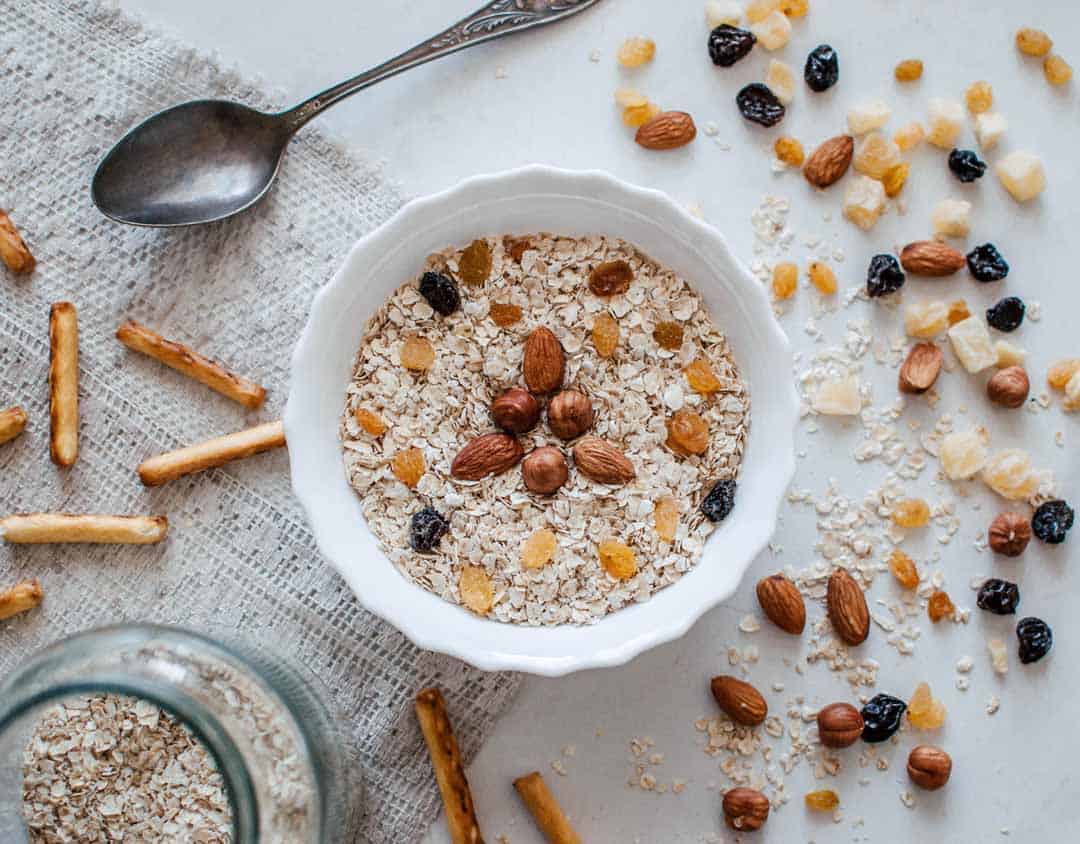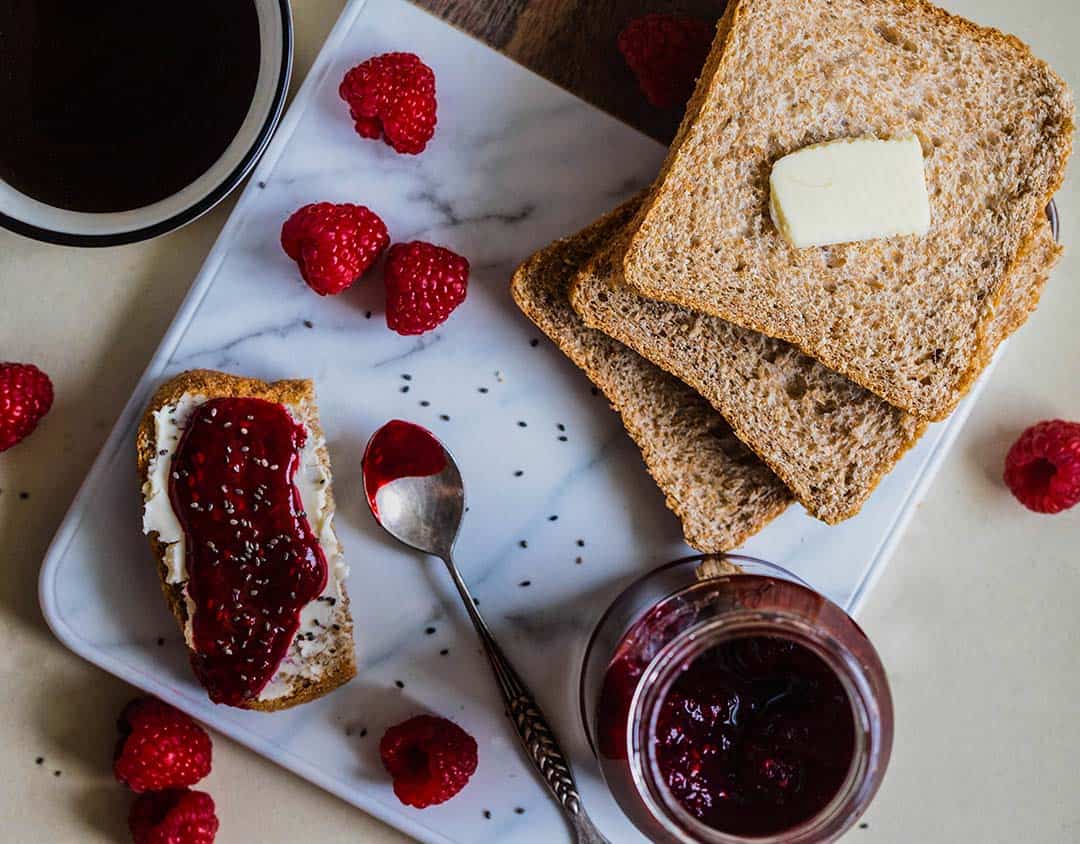
Fibre Fundamentals
October 31, 2019
Chia Seed Jam
April 22, 2020Ever feel like breakfast is too rushed or there’s not enough time to make something before you have to head out the door? These vegetable frittata muffins are one of my favourite to-go breakfasts. They can be made ahead of time and are easy to reheat and take with you, or reheat once at work.
T here are also endless flavour combinations to try, so I promise you will never get bored of them! Here are a few of my favorite combinations:
- Red bell peppers and cherry tomatoes
- Prosciutto, goat cheese, and spinach
- Broccoli (pre-cooked) and cheddar cheese
- Mushrooms, spinach, and ricotta cheese
- Shredded chicken, corn, and mozzarella cheese
When they’re warm from the oven with the melted cheese on top they have a fluffy souffle-like texture, can you say YUM! They are even better the next morning when they become more like mini-casseroles with a crunchy cheesy crust on top.


Vegetable Frittata Muffins
Ingredients
- olive oil for greasing the pan
- 12 eggs
- 1 cup milk (250 ml)
- 1/4 tsp salt
- black pepper to taste
- 3-4 small handfuls fresh spinach chopped
- 1 cup sun-dried tomatoes (80g) chopped
- 1/2 - 1 cup feta cheese (60-120g) crumbled
Instructions
- Preheat the oven to 350°F (180°C)
- Grease muffin pan with olive oil
- In a large bowl, whisk eggs with milk, add salt and pepper to taste
- Chop the sundried tomatoes and spinach into smaller pieces
- Place the vegetables into the bottom of each muffin cup
- Pour egg mixture over the vegetables, until each cup is about ¾ full
- Crumble feta cheese on top of each muffin cup
- Bake for 20 minutes, until the egg muffins are set
- Let cool for a few minutes, then use a knife to scrape around the edges to loosen the muffin from the pan. Enjoy!
Notes


Did you know?
Frittata is an Italian version of an omelet with multiple filling options: from vegetables to meat and cheese. They are a great way to incorporate more protein at breakfast, which helps to keep you full for longer afterwards. Meals rich in protein decrease the levels of ghrelin released after eating, which is an appetite-stimulating gastrointestinal hormone. Have a couple of these muffins with a piece of whole grain toast to create a well-balanced meal.
Eggs are a fantastic source of high-quality protein and fats. Egg whites contain all essential amino acids and are made up of water and protein. Egg yolks contain protein, fats, fat-soluble vitamins (e.g. A, D, E and K) and minerals (e.g. calcium, potassium, magnesium, choline). They also contain lutein and zeaxanthin, which are antioxidants that have been shown to improve eye health. Omega-3 enriched eggs are also another great way to incorporate more omega-3 fatty acids in your diet, which may help to resolve inflammation in the body. There has been significant debate over the past few decades on whether or not egg yolks should be limited or avoided as they contain cholesterol. I want to reassure you that egg yolks are very nutritious and there is no need to avoid them!
Cholesterol is a fat-like substance that is a part of every cell in your body. It is used to make hormones and to make bile which helps us digest food. Because cholesterol is so important to our overall health, our liver actually produces cholesterol all the time. Eating foods that are higher in cholesterol decreases the amount of cholesterol our liver makes so that the levels stay fairly balanced. Therefore, for the majority of people, a diet higher in cholesterol-rich foods doesn’t result in increased blood cholesterol levels. Our overall dietary patterns have a greater impact on our cholesterol levels, for example how much fibre or saturated fat we eat regularly. If you have concerns about your cholesterol levels, reach out to your family doctor or dietitian to determine what is right for you.
Written by Sofya Borisenko and Liz Powell, RD
References:
- Delcourt, C. et al. (2006, June). Plasma lutein and zeaxanthin and other carotenoids as modifiable risk factors for age-related maculopathy and cataract: the POLA Study. Retrieved from https://www.ncbi.nlm.nih.gov/pubmed/16723441
- Fuller, N. R. et al. (2015, April). The effect of a high-egg diet on cardiovascular risk factors in people with type 2 diabetes: the Diabetes and Egg (DIABEGG) study-a 3-mo randomized controlled trial. Retrieved from https://www.ncbi.nlm.nih.gov/pubmed/25833969
- Koliaki C, et al. (2010). The effect of ingested macronutrients on postprandial ghrelin response: a critical review of existing literature data. Int J Pept.
- Jones, P. J. et al. (1996, October). Dietary cholesterol feeding suppresses human cholesterol synthesis measured by deuterium incorporation and urinary mevalonic acid levels. Retrieved from https://www.ncbi.nlm.nih.gov/pubmed/8857917
- Wendy AM Blom, et al. (2006). Effect of a high-protein breakfast on the postprandial ghrelin response, The American Journal of Clinical Nutrition, Volume 83, Issue 2, pp 211–220.




